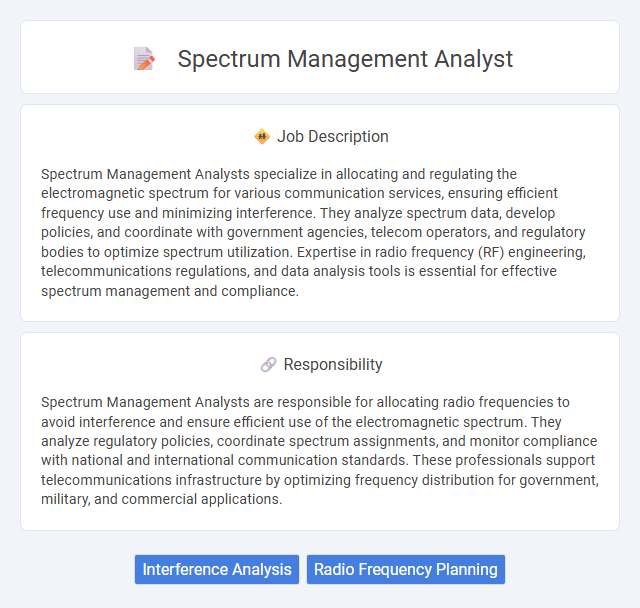
Spectrum Management Analysts specialize in allocating and regulating the electromagnetic spectrum for various communication services, ensuring efficient frequency use and minimizing interference. They analyze spectrum data, develop policies, and coordinate with government agencies, telecom operators, and regulatory bodies to optimize spectrum utilization. Expertise in radio frequency (RF) engineering, telecommunications regulations, and data analysis tools is essential for effective spectrum management and compliance.
Individuals with strong analytical skills and attention to detail are likely to excel as Spectrum Management Analysts, given the job's emphasis on analyzing frequency allocations and resolving interference issues. Those comfortable working with complex technical data and regulatory frameworks may find the role well-suited to their abilities. Conversely, people who prefer less structured environments or dislike dealing with intricate regulations might struggle to adapt to this position.
Qualification
A Spectrum Management Analyst requires a strong background in telecommunications, radio frequency engineering, or electrical engineering, often supported by a bachelor's degree in a related field. Proficiency in spectrum allocation, frequency coordination, and regulatory compliance with agencies such as the FCC or ITU is essential. Analytical skills combined with experience in spectrum monitoring tools and data analysis software greatly enhance the ability to optimize spectrum usage and resolve interference issues.
Responsibility
Spectrum Management Analysts are responsible for allocating radio frequencies to avoid interference and ensure efficient use of the electromagnetic spectrum. They analyze regulatory policies, coordinate spectrum assignments, and monitor compliance with national and international communication standards. These professionals support telecommunications infrastructure by optimizing frequency distribution for government, military, and commercial applications.
Benefit
Spectrum Management Analysts likely offer significant benefits by optimizing radio frequency use, which may enhance communication efficiency and reduce signal interference. Their expertise probably supports regulatory compliance, helping organizations avoid costly fines and legal challenges. Employers could also benefit from improved operational performance and strategic planning due to the analyst's detailed spectrum allocation insights.
Challenge
The Spectrum Management Analyst role likely involves navigating complex regulatory environments and balancing competing demands for spectrum allocation, which can present significant analytical and strategic challenges. Managing interference issues and ensuring optimal use of limited frequency resources will probably require advanced technical knowledge and problem-solving skills. Adapting to rapidly evolving technology and policy changes may introduce ongoing uncertainties that demand continuous learning and flexibility.
Career Advancement
Spectrum Management Analysts play a critical role in optimizing frequency allocation and ensuring regulatory compliance, which directly influences telecommunications efficiency and national security. Advancing in this career often involves gaining expertise in radio frequency engineering, policy development, and emerging wireless technologies, leading to senior roles such as Spectrum Policy Advisor or Radio Frequency Manager. Professional certifications and specialized training in spectrum analysis tools can significantly enhance promotion prospects and salary growth within government agencies or private sector firms.
Key Terms
Interference Analysis
Spectrum Management Analysts specializing in interference analysis assess radio frequency (RF) signals to identify and resolve sources of signal disruption. They utilize advanced spectrum monitoring tools and data analytics to ensure optimal frequency allocation and compliance with regulatory standards. Their expertise in interference mitigation enhances communication reliability across wireless networks and critical infrastructure systems.
Radio Frequency Planning
A Spectrum Management Analyst specializing in Radio Frequency Planning is responsible for analyzing and coordinating the allocation of radio frequencies to optimize wireless communication networks and prevent interference. Their expertise includes frequency assignment, spectrum monitoring, and regulatory compliance to ensure efficient use of the electromagnetic spectrum. Proficiency in RF propagation modeling, spectrum policy, and technical tools like spectrum analyzers enhances effective spectrum utilization and supports telecommunications infrastructure development.
 kuljobs.com
kuljobs.com